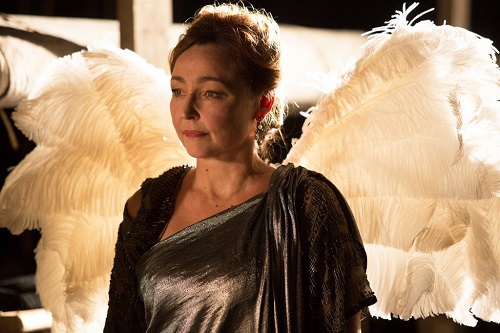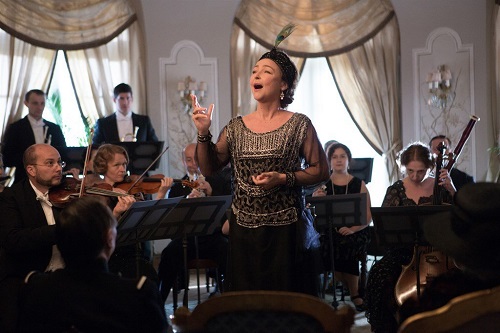Synopsis: Paris, 1920s. Marguerite Dumont is a wealthy woman, lover of the music and the opera. She loves to sing for her friends, although she’s not a good singer. Both her friends and her husband have kept her fantasy. The problem begins when she decides to perform in front of a real audience.
Release Date: April 1, 2016 MPAA Rating: PG-13
Genre(s): Drama,
Film Review

Production
Marguerite takes place in Paris in the 1920s. A Baroness named Marguerite Dumont (Catherine Frot from Haute Cuisine) is a member of The Amadeus Club, a music club which meets at her palatial home and listens to her sing. She has an agonizingly horrible singing voice, but she’s surrounded by sycophants who reassure her that she’s got talent. A music critic named Lucien Beaumont (Waiting for Someone‘s Sylvain Dieuaide) and his sidekick, an opportunist named Kyrill Von Priest (Aubert Fenoy from “Antigone 34”), persuade Marguerite to sing for a bigger audience, and even set a recital up for her. Marguerite’s husband, Georges (Me, Myself and Mum‘s André Marcon), being a realist, tries to dissuade her, but when her servant Madelbos (Dead Man Talking‘s Denis Mpunga) and famous vocal instructor Atos Pezzini (Michel Fau from With a Friend Like Harry.) get in on the joke, Marguerite goes full steam ahead on her collision course with humiliation.

Written and directed by Xavier Giannoli (Eager Bodies) with script collaboration by Marcia Romano (Standing Tall), the story of Marguerite is loosely based upon the life of a woman named Florence Foster Jenkins who, in the 1940s, had a huge passion for music, but like Marguerite, did not have the talent to match that passion. The title character in Marguerite is as sympathetic of a character as one is bound to find these days. She surrounds herself with people who encourage her (“she’s perfectly wild!” they scream after she sings), even when she is hopelessly without talent or ability. There is a pain behind Marguerite’s eyes (a testament to the subtle talent of Catherine Frot), as if she knows that she is the butt of everyone’s jokes but still desperately wants to live out her dreams. The audience roots for her, even when her public performances cause near riots. Everyone around Marguerite wants something from her, whether it’s material gains or just a few laughs, so the audience can’t help but feel sorry for her, and therefore, hope that she spites her secret tormentors and succeeds.
Aesthetically speaking, Marguerite is great. The costumes are flamboyantly gorgeous, the sets are impressively luxurious, and the performances are grinningly melodramatic. The movie is well shot, well-paced, and well crafted – overall, it’s simply a very well-made film. It’s just that, underneath the beautiful façade, there is a very dark and cruel movie waiting to get out.
In the end, Marguerite is more wildly entertaining than a movie as hurtful as it is has any right to be. It’s engaging, humorous, even charming at times, but it’s all at the expense of the lead character. Most viewers will enjoy it, but it’s not going to make anyone proud of that fact.

Score and Soundtrack
The musical soundtrack to Marguerite is packed with classical standards from Mozart, Bach, and Vivaldi (among others), but they’re not used by the film in the traditional cinematic score type of way. When Marguerite sings her arias, the music is laughably bad, the laughing-at-her-not-with-her kind of bad, and Catherine Frot sings wonderfully off-key in a way that seems as if it would be harder to do than sing well – it’s a skillful out-of-tune, so it stays humorous instead of just being painful for the audience. The other singers in the movie all have incredible voices, which only serves to make Marguerite’s vocals sound worse. Marguerite’s warbling is an essential part of the plot, so when she butchers the classics, it’s not just a gratuitous hatchet job. The way the music is used in Marguerite is incredibly effective, but not in the usual filmic way – it tells parts of the story that the dialogue and visuals never could.

Cast and Crew
- Director(s): Xavier Giannoli
- Producer(s): Oliver DelboscMarc Missonnier
- Screenwriter(s): Xavier GiannoliMarcia Romano
- Story:
- Cast: Catherine Frot (Marguerite Dumont)André Marcon (Georges Dumont)Christa Théret (Hazel) Denis Mpunga (Madelbos)Sylvain Dieuaide (Lucien Beaumont)Aubert Fenoy (Kyrill Von Priest)Michel Fau (Atos Pezzini)Sophia Leboutte (Félicité la barbue)Astrid Whettnall (Françoise Bellaire)Théo Cholbi (Diego)
- Editor(s): Cyril Nakache
- Cinematographer: Glynn Speechaert
- Production Designer(s):
- Costume Designer: Pierre-Jean Larroque
- Casting Director(s): Michael LaguensArwa Salmanova
- Music Score: Ronan Maillard
- Music Performed By:
- Country Of Origin: FranceCzech Republic
